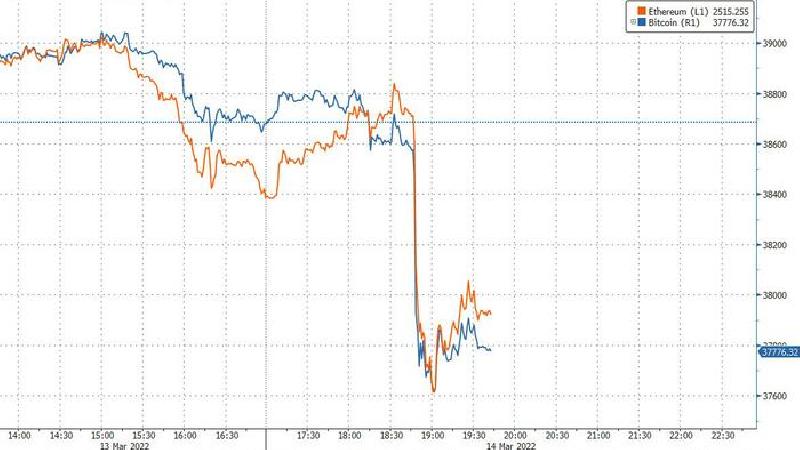Cryptocurrencies stumbled on Sunday evening after trading rangebound for the past two days, following a delayed market realization, and reaction, that on Monday, the European parliamentary committee will vote on a new regulatory framework for crypto assets, which according to Bloomberg could accelerate passage of a measure that industry executives say could “practically ban key digital currencies including Bitcoin and Ethereum in Europe.”
Crypto-assets issued and/or traded in the EU “shall be subject to minimum environmental sustainability standards and set up and maintain a phased rollout plan to ensure compliance” with those requirements, according to the final draft for the Markets in Crypto Assets (MiCA) law, the EU’s sweeping legislative package for governing digital assets, that was seen by Bloomberg News. The Economic and Monetary Affairs Committee will vote on the bill on Monday, and in an unexpected twist, the draft law contains a late addition that looks to limit the use of cryptocurrencies powered by an energy-intensive computing process known as proof-of-work.
Commenting ahead of the vote, Jake Chervinsky, head of policy the Blockchain Association said that “the MiCA situation is worse for crypto than anything in the USA. Tomorrow, the European Parliament votes on “environmental sustainability standards” that look like a pretext for a Bitcoin ban.”
The MiCA situation is worse for crypto than anything in the USA. Tomorrow, the European Parliament votes on "environmental sustainability standards" that look like a pretext for a Bitcoin ban.
If it passes, it can be undone in the next phase of the EU process, but it's very bad. https://t.co/AW1ATE0tqU
— Jake Chervinsky (@jchervinsky) March 13, 2022
As Bloomberg points out, the reference to minimum sustainability as well as rollout requirements, appear to be last-minute changes introduced to curb, or ban, the use of digital currencies working on a so-called “proof-of-work” consensus mechanism, for instance Bitcoin and Ethereum (at least until the rollout of Ethereum 2.0 which is proof of stake). An earlier draft didn’t mention a proof-of-work protocol concept, EU parlamentarian and crypto-expert Stefan Berger of Germany’s Christian Democratic Party said in a Tweet early last week.
CoinDesk reported yesterday that the provision in question requires all crypto assets to be subject to the EU’s “minimum environmental sustainability standards with respect to their consensus mechanism used for validating transactions, before being issued, offered or admitted to trading in the Union.”
For cryptocurrencies like bitcoin and ether, that are already being traded in the EU, the rule proposes a phase-out plan to shift their consensus mechanism from proof-of-work to other methods that use less energy, like proof-of-stake. Although there are plans to move ethereum to a proof-of-stake consensus mechanism, i.e., Ethereum 2.0, such an option is not available for bitcoin.
Proof of work is one of the main consensus mechanism governing the Bitcoin blockchain. Energy-intensive Bitcoin miners contribute computer power to the network, which secures and processes the blockchain, and are rewarded in Bitcoin for their contribution.
A previous version of the law proposed the prohibition of proof-of-work crypto in the EU starting in January 2025. The provision was later dropped following criticism from crypto advocates, before the modified version made it back into the latest draft.
Stefan Berger, the EU parliamentarian charged with overseeing the content and progress of the MiCA framework, has been trying to reach a compromise over restricting proof-of-work. Berger also said at the time that he does not feel MiCA is the place for settling technological or energy-related rules because the framework’s goal is to regulate crypto as assets. Once parliament decides on the draft, it will move on to a trilogue, which is a formal round of negotiations between the European commission, council and parliament.
“The Greens and Socialists, as you can imagine, are criticizing the proof-of-work concept and criticizing the energy use, saying that bitcoin needs more energy than the Netherlands,” Berger said in an interview with CoinDesk in February, referring to the political parties pushing the energy argument.
Furious over whether the new, tougher draft law would be a de-facto ban of Bitcoin, industry executives took their concerns to Twitter on Saturday.
“We at Ledger will always defend freedom and self-custody, particularly in our backyard. We are calling on you all to contact your Member of European Parliament and let them know that you oppose a Bitcoin ban in Europe,” Chief Executive Pascal Gaulthier of Ledger, one of the world’s largest crypto wallet providers said on his Twitter account.
We at Ledger will always defend freedom and self-custody, particularly in our backyard.
We are calling on you all to contact your Member of European Parliament and let them know that you oppose a Bitcoin ban in Europe: https://t.co/KXsEfi468i https://t.co/yZlaRZ97Aa— Pascal Gauthier (@_pgauthier) March 12, 2022
Microstrategy CEO Michael Saylor chimed in that “the only settled method to create digital property is via Proof-of-Work. Non-energy based crypto approaches like Proof-of-Stake must be deemed to be securities until proven otherwise. Banning digital property would be a trillion dollar mistake.”
The only settled method to create digital property is via Proof-of-Work. Non-energy based crypto approaches like Proof-of-Stake must be deemed to be securities until proven otherwise. Banning digital property would be a trillion dollar mistake.https://t.co/h8FTGaGJKi
— Michael Saylor⚡️ (@saylor) March 12, 2022
“Since there is no way #bitcoin can & will implement a rollout plan out of POW, it would affect #BTC as well,” said Patrick Hansen, head of strategy for crypto wallet firm Unstoppable Finance, on Twitter.
“Extremely high stakes vote in the EU. That such a proposal made it this far is extraordinarily concerning and unlikely to stand up to practical reality,” said Jeremy Allaire, founder of Circle Pay, on Twitter.
The good news for crypto bulls is that according to CoinDesk, which cites people familiar with the matter that although the vote remains a close call, a small majority of committee members may vote against the measure. If so, the selloff on Sunday night is merely the latest successful attempt at shaking out the weak holders.
via zerohedge

